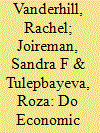| Srl | Item |
| 1 |
ID:
172875


|
|
|
|
|
| Summary/Abstract |
Kazakhstan has followed a foreign policy of multivector diplomacy since its independence from the former Soviet Union. While multivectorism was a strategy of necessity in its early years, it has evolved to empower Kazakhstan to effectively protect its independence and negotiate its relationship with the great powers on its borders and further afield. After the 2014 Russian seizure of Crimea it is noteworthy that Kazakhstan has maintained positive relations with Russia while asserting its sovereignty and independent foreign policy. In this article we investigate how Kazakhstan has negotiated the rise of China, taking advantage of the economic opportunities it presents. We trace the foreign policy of Kazakhstan from independence forward, examining its relationships with its Great Power neighbours and its role in international organizations and negotiations. We posit that multivectorism is similar to the strategy of omni-enmeshment and complex balancing seen in south-east Asia. Both are effective methods for secondary powers to protect their sovereignty and to coexist with Great Powers without becoming their client states. Kazakhstan's approach to foreign policy is an exemplar for secondary states. This article contributes to the literature on the strategic decision-making of secondary powers and to the theoretical analysis of the foreign policy of Kazakhstan during a critical moment of transition from the long-time rule of Nursultan Nazarbayev to the presidency of Kassym-Jomart Tokayev.
|
|
|
|
|
|
|
|
|
|
|
|
|
|
|
|
| 2 |
ID:
165345


|
|
|
|
|
| Summary/Abstract |
Foreign direct investment (FDI) can deliver benefits beyond the provision of capital, such as efficiency gains. We argue that the theorised positive effects of economic linkage are reduced when linkages are based on natural resources. Domestic elite coalitions supporting reform are also weaker in countries with extensive natural resources. Kazakhstan and Azerbaijan have high-value natural resources and significant FDI, making them most likely cases for reform. Kyrgyzstan is a contrasting case as it has few natural resources. We find that the institutional reforms we would anticipate because of linkages have not occurred and those that exist are often cosmetic.
|
|
|
|
|
|
|
|
|
|
|
|
|
|
|
|
| 3 |
ID:
051891


|
|
|
|
|
| Publication |
Jan 2004.
|
| Summary/Abstract |
After decades of cycling violence between Hutu and Tutsi groups in Rwanda and Burundi, violence peaked in 1994 with a genocide of Tutsis in Rwanda, during which the Hutu majority slaughtered 800,000 Tutsi and moderate Hutus, leaving the country with 120,000 accused génocidaires awaiting trial. Rwanda's gacaca courts were established as a response to the backlog of untried genocide cases. These courts disturbingly distinguish between genocide and war crimes committed during the same era, trying only those accused of genocide. This article argues that the gacaca process will contribute to the insecurity of all Rwandan citizens in the future, since it pursues inequitable justice, accentuates the ethnic divide and will be interpreted as revenge.
|
|
|
|
|
|
|
|
|
|
|
|
|
|
|
|